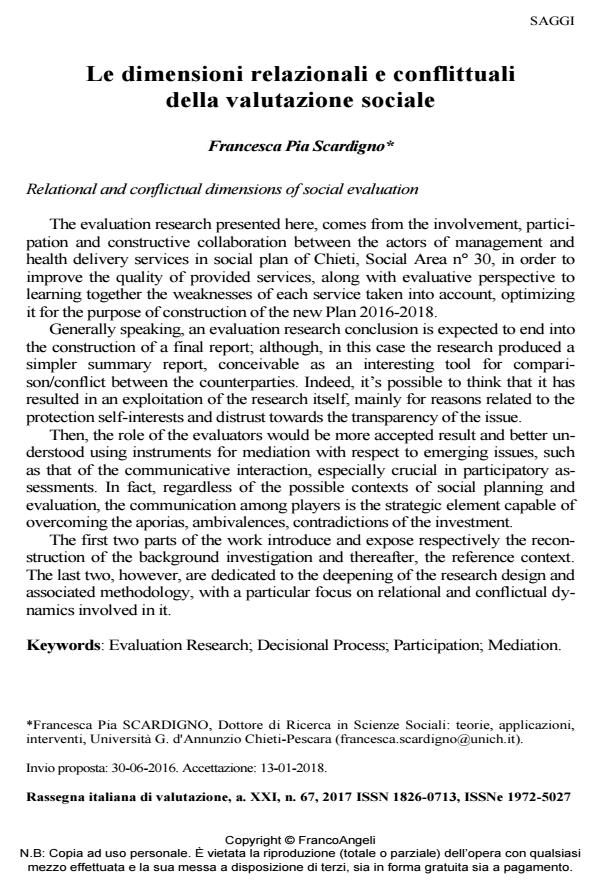Relational and conflictual dimensions of social evaluation
Journal title RIV Rassegna Italiana di Valutazione
Author/s Francesca Pia Scardigno
Publishing Year 2018 Issue 2017/67
Language Italian Pages 20 P. 63-82 File size 476 KB
DOI 10.3280/RIV2017-067005
DOI is like a bar code for intellectual property: to have more infomation
click here
Below, you can see the article first page
If you want to buy this article in PDF format, you can do it, following the instructions to buy download credits

FrancoAngeli is member of Publishers International Linking Association, Inc (PILA), a not-for-profit association which run the CrossRef service enabling links to and from online scholarly content.
The evaluation research presented here, comes from the involvement, participation and constructive collaboration between the actors of management and health delivery services in social plan of Chieti, Social Area n° 30, in order to improve the quality of provided services, along with evaluative perspective to learning together the weaknesses of each service taken into account, optimizing it for the purpose of construction of the new Plan 2016-2018. Generally speaking, an evaluation research conclusion is expected to end into the construction of a final report; although, in this case the research produced a simpler summary report, conceivable as an interesting tool for comparison/conflict between the counterparties. Indeed, it’s possible to think that it has resulted in an exploitation of the research itself, mainly for reasons related to the protection self-interests and distrust towards the transparency of the issue. Then, the role of the evaluators would be more accepted result and better understood using instruments for mediation with respect to emerging issues, such as that of the communicative interaction, especially crucial in participatory assessments. In fact, regardless of the possible contexts of social planning and evaluation, the communication among players is the strategic element capable of overcoming the aporias, ambivalences, contradictions of the investment. The first two parts of the work introduce and expose respectively the reconstruction of the background investigation and thereafter, the reference context. The last two, however, are dedicated to the deepening of the research design and associated methodology, with a particular focus on relational and conflictual dynamics involved in it.
Keywords: Evaluation Research; Decisional Process; Participation; Mediation.
- Altieri L., (2009) Valutazione e partecipazione. Metodologia per una ricerca interattiva e negoziale. FrancoAngeli, Milano.
- Altieri L., e Migliozzi D., a cura di (2007). Una ricerca di qualità. La spendibilità della ricerca-valutazione nei programmi sociali, in Cipolla C. Il ciclo metodologico della ricerca sociale, FrancoAngeli, Milano.
- Bertin G., (2007) Governance e valutazione della qualità nei servizi socio-sanitari, FrancoAngeli, Milano.
- Bezzi C., (2010) Il nuovo disegno della ricerca valutativa, FrancoAngeli, Milano.
- Bruschi A., (2005) Metodologia della ricerca sociale, Edizioni Laterza, Bari.
- Bush R.A.B. e Folger F.P., (1994), La promessa della mediazione. L’approccio trasformativo alla gestione dei conflitti, Vallecchi, Firenze.
- De Ambrogio, U. (2000). La valutazione partecipata nei servizi sociali. La descrizione di un approccio attraverso alcuni esempi concreti. RIV Rassegna Italiana di valutazione.
- De Ambrogio U., a cura di (2003). Valutare gli interventi e le politiche sociali, Carocci Faber, Roma.
- Foresti, M. (2003). La partecipazione in ambito valutativo: mito o realtà? Teoria e pratica degli approcci partecipati in valutazione. RIV Rassegna Italiana di valutazione
- Habermas J., (1997), Teoria dell’agire comunicativo, Il Mulino, Bologna.
- House E.R e Howe K.R., a cura di (2007) Valutazione e democrazia deliberativa, in Stame N., Classici della Valutazione, FrancoAngeli, Milano.
- Luison, L. a cura di (2006), La mediazione come strumento di intervento sociale, FrancoAngeli, Milano.
- Maggian R., (2011) Guida al Welfare italiano. Dalla progettazione sociale alla gestione dei servizi. Manuale per operatori del Welfare locale, Maggioli Editore, Santarcangelo di Romagna.
- Palumbo M. e Congiu D., a cura di (2016) Partecipazione e Valutazione per il Piano Regolatore Sociale, FrancoAngeli, Milano,in Palumbo M., Torrigiani C., La partecipazione fra ricerca e valutazione, FrancoAngeli, Milano.
- Palumbo, M. (2003). La valutazione partecipata ei suoi esiti. RIV Rassegna Italiana di Valutazione.
- Palumbo, M. e Torrigiani, C. a cura di (2009). La partecipazione fra ricerca e valutazione, FrancoAngeli, Milano.
- Rossi P., (2014). L’organizzazione dei servizi socio assistenziali, Carocci Faber, Roma
- Stame N., (2016). Valutazione Pluralista, FrancoAngeli, Milano.
- Tomei G., a cura di (2012) Il contributo della valutazione della qualità alla determinazione riflessiva e partecipata dei Liveas, in Costa G, Diritti in costruzione. Presupposti per una definizione efficace dei Livelli Essenziali di Assistenza Sociale, Bruno Mondadori, Milano.
- Tomei G., (2006), Valutazione partecipata della qualità, FrancoAngeli, Milano.
- Tomei, G. (2010). Valutazione, cittadinanza, partecipazione, special issue of Rivista Trimestrale di Scienza dell’Amministrazione.
- Torrigiani C., a cura di (2009) Partecipazione e valutazione partecipata, FrancoAngeli, Milano in Palumbo M., Torrigiani C., La partecipazione fra ricerca e valutazione, FrancoAngeli, Milano.
Francesca Pia Scardigno, Le dimensioni relazionali e conflittuali della valutazione sociale in "RIV Rassegna Italiana di Valutazione" 67/2017, pp 63-82, DOI: 10.3280/RIV2017-067005